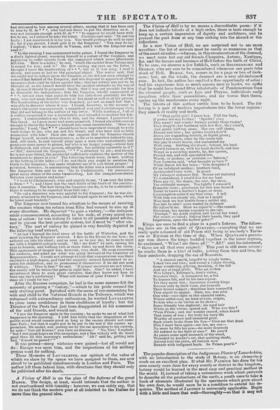A Vision of Hell is on the plan of the
Inferno of the great DANTE. The design, at least, would intimate that the author is not overburdened with timidity : however, we can safely say, that we do'not think the modern poet at all indebted to the Italian for more than the general idea. The Vision of Hell is by no means a discreditable poem: if it does not indicate talents of a high order, there is taste enough to keep up a certain impression of dignity and awfulness, and to prevent the poet from at any time sinking into the absurd or the. ridiculous.
In a new Vision of Hell, we are surprised not to see more novelties : the list of arrivals must be surely as numerous as that of the court circular,—whereas, in this enumeration of the damned, we meet none but our old friends Cleopatra, Antony, Xantippe' &c. and the heroes and heroines of Hell before the birth of Christ. - To be sure, we observe a few Infidels, such as BOLINGBROKE and GIBBON, who are sure to be remembered whenever our poets take stock of Hell. BYRON, too, comes in for a page or two of dark- ness ; but, on the whole, the damned are a very old-fashioned race. In fact, the author has omitted a fine opportunity of satire : had his experience lain as much among men as books, we opifie that he could have found fitter inhabitants of Pandemonium than the classical people, such as Lais and Phryne, individuals sadly forgotten, while their peccadilloes, and far worse than theirs, spring up like mushrooms every night.
The talents of this author entitle him to be heard. The fol- lowing is a pair of modern importations into the lower regions : they smack of reality and truth.
" That pallid girl ! I knew her. Call her back,
If power belongs to thee." Spirits ! obey This wand ! and winds! forbear awhile those twain' They stopp'd ; her husband with her flew; they turn'd, And gently wafting, came. Her eye still shone, Humid and blue ; her golden tresses How'd Down her expanding breasts, in liquid grace; Alter'd not much, since by the ocean tide She play'd sweet music, and enchanted me With song. Sobbing she stood ; behind, his back Turn'd towards us, with his bead declin'd, and face Wrapt in a covering mantle, he, her spouse, Paused sad, and still ejaculated low, Words, or profane, or penitent :—' Inform,' Now Leonora said, what brought ye here ?' While fluent fell her tears : ' Sole daughter I Of an indulgent mother ; brothers fond, Anticipated every wish. In peace
My youngest summers fled. Scarce yet matured To womanhood, I own'd him for my lord. Then gayety, the dance, the rout, the show, The midnight masque. Too lightly I estecm'd Domestic cares ; perchance for this was doom'd Never to know a mother's hopes or fears. Consumption enter'd my blue veins. I left With him our cloudy isle, that so I might Woo back my lost health from a milder sky. Too late to save ! soon wasted by debauch He follow'd me. Here we rejoin'd.'—She ceased. Shrieking, her spouse assented to the tale.
Enough !' my guide replied, and waved her wand.
The winds resumed; linking their hands, they sped
Impetuous, upon the hollow gales !"
Kings are sure to find a place in a poet's Inferno. The follow-
ing lines are in the spirit of QUEVED0,—excepting that we are really quite ashamed of old Priam still being in an} body's Tarta- rus or Elysium at this time of day. When QUEVEDO'S person- age was shown the kings huddled together in the lower regions, he exclaimed, " What ! are these all ?" " All !" said his informant, " these are all that ever reigned." This poet is still more severe : he works them in a kind of hulks, yoking them two and two, for their misdeeds, dragging the car of Sesostris.
"A chariot pass'd, impell'd by kingly forms, Yoked two and two; and round a vulgar throng, Some wondering, pitying, mocking, at the fall And use of regal pride. Who sat within Was Libya's, Ethiopia's, Asia's victor, Sesostris then. A conqueror he, a foe
To human life, and to his own repose. Yet they more vile ; luxurious wanton kings Known only by their vices, else beneath Their lowest subject ; therefore here compell'd Thus abject to appear. Here, too, was seen One who—rare sight in this unsocial realm, "Where selfishness, no least of evils, reigns, To him who is its victim or its slave—
Some friendly loss deplored ; his aged hair White as the winter, spared not. Who was this?! 'Twas Priam; and our wonder ceased, when beard That name of woe ; for truly his were ills Worthy of sorrow and immortal grief. Such words broke from his Give me that dead.
Him I must have again—my son, my son—
No more he lifts his arm—no more descends All radiant to the fight of men !' He pass'd As passes some aged monarch of the wood, Wounded by hunter's art, that quitting shade, Abroad into the plain, all furious now Bounds with indignant haste. So Priam pass'd."


























 Previous page
Previous page